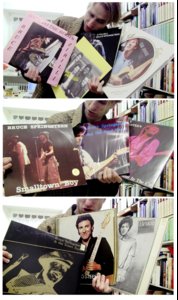For 99.9% of professional musicians now, the bulk of the money is made from live shows, but that's a 180 degree turn from the way it was traditionally, when bands would tour to sell records. So back in the day, I think the argument was that live bootlegs cut into tour profits, which ultimately affected record sales. The reality is those bootlegs didn't really have wide enough distribution to cut into anyone's pie, but I suspect that's the way it was seen from the (big) music business side of the fence.
As a consumer you're not necessarily benefiting from that 180 degree change, because you're paying for it at the ticket window if you go to live shows. So we traded cheaper (or free) music for more expensive shows. But of course from a musician's standpoint it's a better deal, since the record company can't fuck you out of tour receipts. You know, unless you owe them millions of dollars, which most young bands on big record labels do.
The rise of the Internet has made it possible for a band to have a relatively small following and still survive, and that's good for musicians, music and anyone who loves music. The Grateful Dead (of all people) were the first to recognize that kind of shift, way before technology made it inevitable, since they sold fewer records than most big bands and made most of their money on the road. Which is probably why they encouraged bootlegging, going so far as to set up special roped-off areas near the mixing board for people to set up microphones and recorders and not be jostled by a bunch of spinning hippies banging on tambourines.
Any way you slice the argument, music and most musicians will only benefit from the death of the record companies. It's a painful transition sometimes while we figure out how things are going to work, but it's a positive one. For proof of that, all you have to do is look at who is most resistant to the changes: the record companies.

